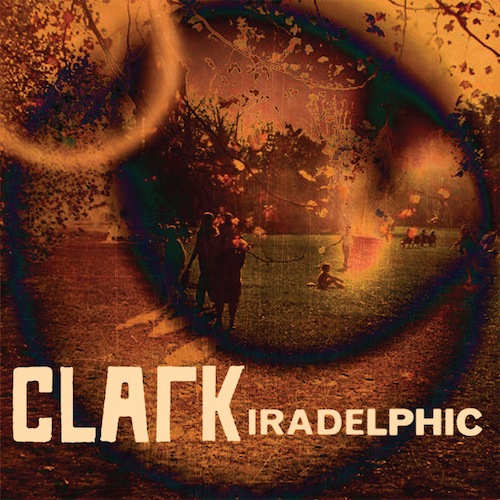Clark’s production skills on Totems Flare, Body Riddle or Clarence Park are so pronounced that you almost want to pick your favourite note in the world and ask him to record it for you, on continuous loop, so you can listen to it forever. But appreciation of Chris Clark’s music so often focuses on his production skills, to the detriment of an appreciation of his performance. With Iradelphic, which has evolved out of Clark’s live shows, marks a change and may be a little surprising to longstanding fans of the man – it’s less ethereal, more compact and cohesive than the electronic experiments of Clarence Park.
Throughout, Iradelphic uses a repertoire of traditional-sounding arrangements and instruments (from the opening guitars of ‘Henderson Wrench’, an instrument which Clark admits he’d never tried before and which he played "pretty obsessively everyday for about a year", to ‘Black Stone’, two minutes of solo piano), and blends them more softly with the usual electronic arrangements. Kicking off with those ‘Henderson Wrench’ guitars, Iradelphic is perhaps Chris Clark’s attempt to signal that ‘player’ element of his sound, at least marry it with his reputation as a production maestro; picked strings, distant, play eerily-lonely, until he cuts in a wall of percussion and layered, latino-sounding high-end guitar; it literally swoops into the recording.
But the real difference with Iradelphic is not in instrumentation alone. This is a very cohesive album, and in a sense can be divided into three parts: a kind of ‘virtuoso’ beginning, where Clark lets the instruments run wild followed by a tight and terse soul-pop middle section. This is perhaps the biggest departure, complete with vocals from Martina Topley-Bird and also Mr. Clark himself. The final chapter unites those two themes in ‘The Pining’ parts one, two and three, and in which the album opens out, back into the kinds of ethereal territory Clark often deals in. In each case, a sort of intermission track – ‘Skyward Bruise / Descent’, ‘Black Stone’, and the album’s final, endless-seeming tonal expanse, ‘Broken Kite Footage’ – divides the sections.
Speaking about Iradelphic, Chris Clark has said "It feels like it’s been a massive test, a huge, all engulfing self imposed boundary that I had to step over, can I transform all this wild instrumentation and confounding, chaotic will into something with a monolithic unity, can I bring all of these seemingly contradictory shifts in mood into a homogenous whole? I hope I’ve nailed it." Job done sir.


